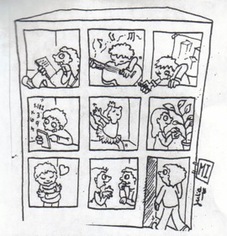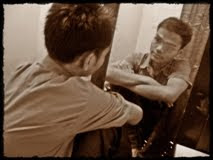Every teacher must agree that assessing student is a must but not all of them know what must be assessed and how they should assess. As we have seen and experienced during primary and secondary school, teachers mostly focuses merely on the final result, without considering the process students do to get it. In many cases, the result only shows students’ cognitive ability—which is the little piece of their ability. Meanwhile the bigger parts of their understanding are shown in the learning process, and it ‘s seldom assessed until it buried under the surface . Just like an iceberg.
In my opinion, if a teacher just concern on this kind of treatment, then s/he cannot see the students as a human. Students are seen as robots, who are just given some orders to be finished and then s/he will recognized them by looking at the result. If they can’t do the test successfully, then they will not be regarded as a good robot. –( This is happened in our country—I bet you realized it—especially in the national examination)—
Whereas actually, if the teachers have a will to dive deeper in to The Ocean of Students Soul, they will see a lot of hidden potencies that are buried because they never give attention to. There are many aspects to be assessed since students are diverse human, so not of them can be treated as the same. I remember a story about a teacher who used to assess her students simply using worksheet, and when there is a student who can’t answer it, she evaluated her teaching way. When she changed the model of assessment, the miracle happened; the students who are weak in answering the sheet can show better performance in another task, e.g. exhibition or presentation.
Well, if we want to regard students as whole human, we shouldn’t use Iceberg model to assess them, yet a house-building process—borrowing Yosea’s term. We shouldn’t use summat ive assessment only, but also formative and diagnostic ones.
ive assessment only, but also formative and diagnostic ones.
The proper application of those assessments can be analogized as the process of building a house. The diagnostic assessment is used at the beginning of the learning period so that teacher can use the result to determine the appropriate treatment for students—a strong foundation. The following process is also important, how to construct and combine all elements needed to build the house. Teacher should give a lot attention in this stage because students often show their real understanding here through their cognitive, affective, and psychomotor ability. And by seeing the result of formative assessments, teacher can give them feedback which parts of the lesson still need improvement. Finally, to finish the process, we put roof on the top of the building. This is the time when summative assessment needed; to cover what students have learnt during a period of lesson.
If we use this analogy, we can see that when we build a house, the proportion of each part is not same. The height of the wall is not same with the roof. That’s why a teacher should share a fair proportion among those kinds of assessment. Just like in SSE, we are assessed by using many variation of assessment, and the final exam is not the only decision. I feel be regarded as a whole human, with all characteristics, uniqueness, and talents. How lucky I am...










